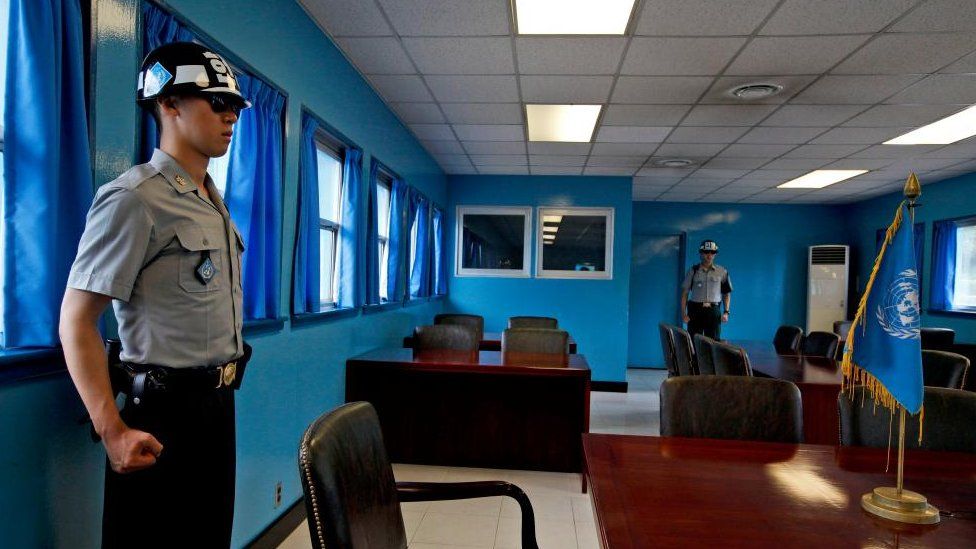A US soldier is being held in North Korea after crossing the border from South Korea without authorisation, the US military has confirmed.
The crisis comes during a particularly tense time with the North, one of the world’s most isolated states. The US tells its citizens not to go there.
Here we look at what we know so far about the incident.
What happened at the border?
Private 2nd Class (PV2) Travis King, 23, crossed from South Korea into the North after joining a Demilitarised Zone (DMZ) border tour.
At the time he was being escorted back to the US to face disciplinary action.
But he did not board the plane. Instead, he reportedly arrived at the boarding gate at Incheon Airport alone as military police officers were not allowed to accompany him all the way to the plane.
At the gate, he reportedly approached an American Airlines official, claiming his passport had gone missing. An airline employee then escorted him out of the departures area.
He then made his way out of the terminal to the border crossing about 54km (34 miles) away.
An eyewitness on the same border tour described hearing the soldier laughing loudly before making a run.
The United Nations Command, which operates the DMZ, said it believed the soldier was now in custody of the North.
A senior US commander said there had been no contact with the soldier and the incident was being investigated by US Forces Korea.
US Defense Secretary Lloyd Austin has said the Pentagon’s main concern is for the soldier’s welfare.
What do we know about the soldier?
PV2 King has been in the Army since January 2021. He is a cavalry scout – a reconnaissance specialist – originally assigned to an element of the army’s 1st Armoured Division on a rotation with the US military in South Korea.
He had been held in a detention facility in South Korea’s capital Seoul after getting into fights. He was reportedly investigated for assault in September 2022.
Local media reports he was suspected of punching a Korean national in a Seoul nightclub.
He was also fined 5m won (£,3,000; $3,950) for “repeatedly kicking” the back door of a police car and screamed “foul language” at the officers trying to apprehend him.
Local reports quoting officials said he was released on 10 July after serving two months in jail on assault charges.
He was released to Camp Humphreys – an army base in South Korea – for out-processing.
He was later escorted to the airport in Incheon, Seoul, for a flight back to the United States, where he was to face disciplinary action.
A US defence official confirmed PV2 King had been due to travel to Fort Bliss in Texas where he was to be administratively separated from the army.
A defence official said the soldier had “wilfully” crossed the border.
Did the soldier plan his move?
It appears his move was indeed pre-planned.
The host of the North Korea podcast, Jacco Zwetsloot, worked for a tour company in 2012 that took US soldiers to the JSA. He says there is “no way this person could escape from the airport one day and book on to one of these tours the next”.
He explains that it usually takes three days to be authorised to go on one of these trips. You need to submit your passport number and military ID to the UN Command, which operates the area.
“When I was leading the tours, we had to change the turnaround time from 48 to 72 hours because there were too many mistakes,” he says.
Also, since the pandemic, it has been much more difficult to get on these tours. They only restarted recently, and it seems there are just two companies offering tours to foreigners. To book this would have required research and planning.
Why is this so tricky for the US?
Recent escalating tensions on the Korean peninsula have become more of a foreign policy priority for US President Joe Biden’s administration.
The incident came on the day that a US nuclear missile submarine arrived in the South Korean port of Busan – a visible demonstration of US military strength that angered the North Koreans.
The move was a US response to more than a hundred new North Korean missile tests over the past few years.
The soldier could potentially become a new bargaining chip for the North to use when dealing with the US.
What happened to Americans detained by North Korea in the past?
US citizens have been detained there several times since 1996. They included tourists, scholars and journalists.
In July 2017, the US government banned US citizens from visiting the country – a move that has since been extended until at least August this year.
US prisoners have typically been treated brutally in North Korean prisons.
In 2018, the North released an American college student, Otto Warmbier, who had been imprisoned for stealing a hotel sign. He returned to the US in a coma and later died.
Related Topics
- North Korea–South Korea relations
- United States
- North Korea
